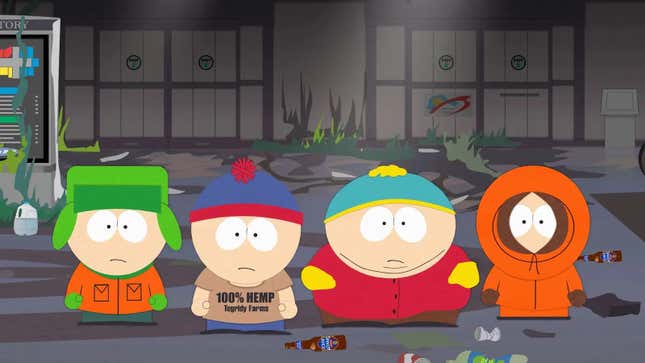Dinner with the Marshes - SOUTH PARK
South Park has taken on racism frequently in its long run, memorably dropping the n-word 42 times in one episode (“With Apologies To Jesse Jackson”) to make a point about cancel culture and performative redemption before those words were part of the cultural conversation. In that episode, Randy Marsh has to face the stigma of being called “[n-word] guy” after he guesses it (wrongly) as the answer to a puzzle on Wheel Of Fortune. The point was that white people like Randy may not consider themselves racist, but are blind to the harm slurs inflict until they’re the ones being targeted.
“The Big Fix” shows that Randy still hasn’t learned anything 15 years later. At a marijuana growers convention, he attends a talk about racial inequities within the industry. Not surprisingly, the message that communities of color are excluded from the profits of legalization despite being most affected by the racist war on drugs is totally lost on him. Instead, he focuses on the warnings of potential consumer backlash against all-white-owned businesses. To improve his public image, and thus his bottom line, Randy latches on to the closest Black person he can find, the father of Stan’s classmate Token (more on him later). It’s pretty clear Randy’s shamelessly using the guy, who catches on quickly and winds up flipping the script, harnessing the power of his own street cred to become Randy’s biggest competition
Randy may never recognize his racist blind spots, but at least Parker and Stone seem to be aware of their own. It’s also in this episode that they retcon the name of the only Black kid on the show, up until this point known as Token Black. It’s revealed that his name is actually Tolkien, in honor of his father’s favorite author, J.R.R. Tolkien. Stan—and by implication, the audience—has supposedly been hearing it as “Token” all this time due to unconscious biases. It’s a pretty good meta joke that forces us to examine the biases we have in real life, as Stan’s doctor instructs us to do at the end of the episode. Addressing the audience directly, he says, “If you or someone you know thought the name Token didn’t come from J.R.R. Tolkien, then please call 1-800-I AM A GIANT PIECE OF SHIT.”
